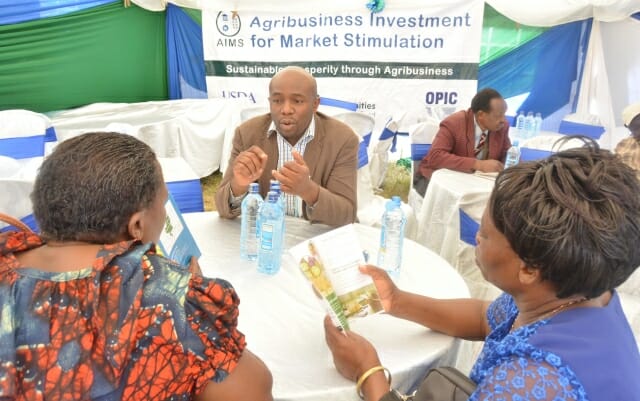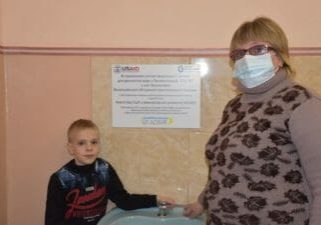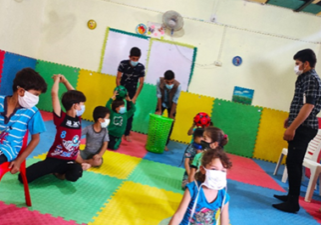News > Blog
Is It Too Late for Systems Thinking? Lessons Learned on Adopting a Market Systems Approach Mid-Program
Published 07/09/2019 by globalcommunities

By Karla Yoder, Global Communities Economic Development/Workforce Specialist
This blog was originally published on Marketlinks.org
Agribusiness Investment for Market Stimulation (AIMS) is a U.S. Department of Agriculture (USDA)-funded initiative to promote trade in Kenya, Tanzania and Malawi by increasing access to finance and markets for agricultural small and medium enterprises (A-SMEs). AIMS was not initially designed and implemented as a market systems development program. The original interventions relied primarily on direct and supply-driven services to A-SMEs and financial institutions. To have greater impact and create more sustainable changes and efficiencies within each of the target subsectors, Global Communities introduced a market systems approach in the second year of the program. This meant revising intervention strategies, and re-orienting staff, implementing partners and the target A-SMEs to a new way of understanding their roles. The shift in approach also required re-communicating AIMS’ activities and strategies to institutional and private sector partners, to assess their buy-in to a more facilitative way of working with AIMS.
There are the more obvious steps to take in implementing such a change in approach—such as providing staff with training in market systems and putting in place internal review and learning cycles to continuously adapt interventions to each context and market system—but others became clear later. What follows are some considerations that any entity looking to replicate this process would want to take into account:
The reorientation will likely necessitate assessing and adjusting management and HR systems to promote creativity, team engagement and collaboration, and ensuring a safe culture where technical staff can continue taking greater ownership of the learning and adaptation process, and be adaptable when things don’t go as expected.
The focus on leadership development and adaptive management must increase among staff. Leadership at all levels need to be interested in learning about successes and failures, and be able to create a safe space for staff to express, analyze, discuss and reassess the effectiveness of various interventions and activities. But it can take time and understanding that not all staff will advance at the same pace which requires oversight and coaching.
Reaching out to partners and beneficiaries with new messages and expectations is vital. Language needs to be tailored to reflect business terms and incentives, rather than donor/development lingo. For example, be clear with partners and businesses that they will share the costs and responsibility of any activity, and that it will be an “investment” on their part to access new markets, improve business management, access finance, etc. Delivering this message consistently takes discipline, given how much easier it can be to engage partners using more traditional development language promising resources and direct support.
If shifting to a market systems approach, leadership should recognize the importance of identifying partners that are motivated by market incentives, and the time it takes to identify the right ones. AIMS has found that cooperatives or member associations are more likely to have governance issues and may be more habituated to receiving donor support for their activities, lowering their likelihood of buying into facilitative partnerships founded in real market incentives.
In addition to selecting the right private sector partners – both existing and prospective – for specific interventions, staff need to recognize the challenges associated with taking a market systems approach when implementing partners are unfamiliar with the concepts. For this reason, it can also be beneficial to train implementing partners in market systems concepts, both to have a consistent strategy and approach, and to build their capacity in using a more sustainable market-driven model.
The way of thinking about partnerships needs to shift toward “scaling” partners, entities which will have the interest and ability to grow the new business practices and linkages which may not be the traditional groups organizations have worked with.
AIMS has achieved positive outcomes not in spite of shifting its approach, but because of it, by applying previously learned lessons and remaining flexible. While it is challenging to change mindsets and disrupt expectations for both program staff and partners, businesses are taking up new behaviors—such as increasing agrilending (banks), engaging service providers on a fee-for-service basis (SMEs), and targeting marketing and pricing to SMEs (BASPs). Despite the attenuated timeframe stemming from AIMS’ mid-course correction, these wins provide encouraging evidence of new and sustainable market-based relationships that have the potential to scale and create significant impact on agricultural trade over the long-term.
Brief: Is it Too Late for Systems Thinking?






